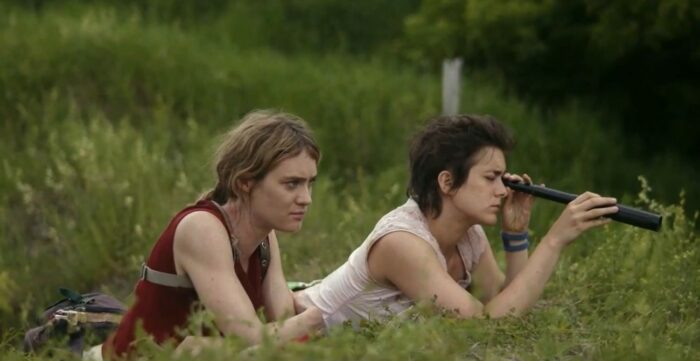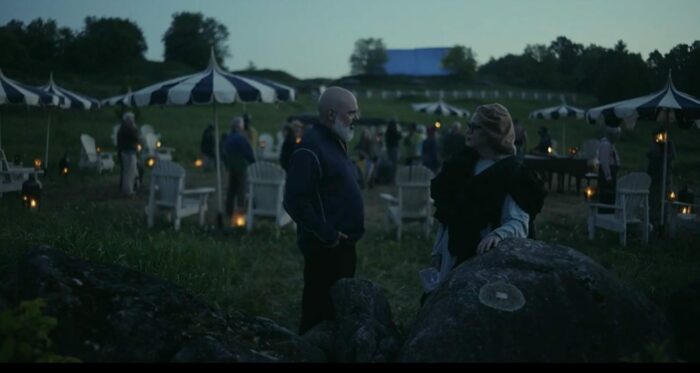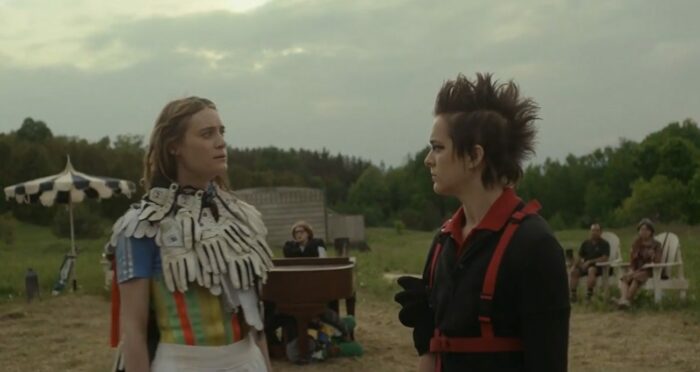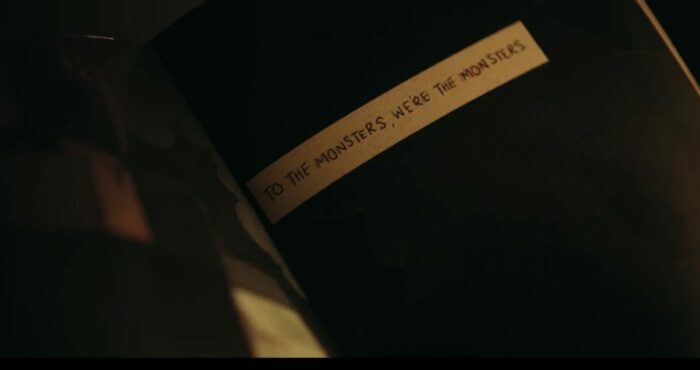The following contains spoilers for Station Eleven Episode 4, “Rosencrantz and Guildenstern Aren’t Dead” (written by Nick Cuse and directed by Helen Shaver) and Episode 5, “The Severn City Airport” (written by Cord Jefferson and directed by Lucy Tcherniak)
There is an undeniable intensity to Station Eleven. It is hard to tell how much of that has been compounded by the state of the world over the past two years, but it is certain that our own pandemic is shaping the way we experience the show. But the driving tension never feels forced or unwelcome. The characters are so nuanced and feel so real that the world falling apart—or being rebuilt—around them is incredibly moving. In Emily St. John Mandell’s novel, this experience spans the decades and shifts point of view characters with each chapter. Similarly, show creator Patrick Somerville has structured the show to focus each episode from a single character’s perspective and has slowed down the narrative considerably in order to intensify our connections with them.
Unfortunately, HBO Max has decided to release the episodes in blocks. This is not a show designed to binge, it would be better to experience each episode as a standalone piece. Each episode is given its own setting, themes, and central characters, and they are all only tied together through circumstance and Miranda Carrol’s (Danielle Deadwyler) graphic novel of the title and the life of Arthur Leander (Gael Garcia Bernal). As viewers of the show we are given new perspectives, new experiences, and new understandings in every episode. This artistry, and emphasis on making every episode feel structured and every character meaningful, is what makes Station Eleven so much more than just a show about a pandemic.
Episode 4: “Rosencrantz and Guildenstern Aren’t Dead”
For Episode 4, we focus once again on the “20 years later” timeline and the Travelling Symphony. Kirsten (Mackenzie Davis) is, justifiably, shaken after her run in with The Prophet (Daniel Zovatto) in “A Hawk From a Handsaw”. The Prophet had made his way into the group and regaled Kirsten and Alex (Philippine Vege) with his sad tale of a dead wife. But Kirsten is clearly suspicious of everything and as we learn from flashbacks here, has always been paranoid and suspect of anything that seems to good to be true. So she ultimately stabbed him and left him for dead. Unfortunately, he survived and is now lurking in the shadows, watching the Symphony and creating chaos to force them to change their plans and fall into his traps.

The Symphony does not deviate from their structure. They play Shakespeare and do not adapt or update it. They travel the same route, the same way, year after year. This structure is how they deal with the pain and loss they have seen and are trying to move beyond. The Travelling Symphony is both incredibly different than anything these characters would have experienced in the world before the flu, but also their way to recreate the lives they had. By fashioning art, drama and music, they are able to live and abide by the mantra from Station Eleven that seems to be Kirsten’s defining takeaway: “Survival is insufficient.”
Part of that structure had been an annual split where the actors went to a community set on a former golf course to perform while the musicians went further along to play for a group of music lovers. We learn that The Conductor (Lori Petty) no longer allows this split because her former lover Gil (David Cross), the Symphony’s former Director, now lives in Pingtree, a community built around a golf course, with his new wife. In order to track The Prophet, Kirsten convinces The Conductor to go back to visit Gil, insisting that she heard Gil’s new wife had died. So the Symphony splits up, and with the split their safety and security are broken.

Once reunited with Gil, the actors are forced to endure both his insults about their acting ability and resistance to change and also to grapple with the life they have chosen, never settling down, never really trying to set up any sort of stability in the uncertain times. Unfortunately, the citizens of Pingtree have had a lot of experience with The Prophet. He visited, telling them the same lies about who he was that he used on The Symphony and wound up convincing all of the children to leave with him. This establishes The Prophet as both “Pied Piper” and would be savior for this new generation of children, those born after the pandemic. The Prophet considers them innocents and more pure than the evil liars of the previous era. Of course, the irony of this master manipulator being the one who keeps preaching about purity is central to the character.
Change is all over “Rosencrantz and Guildenstern Aren’t Dead.” After Gil’s ribbing of the group for never adapting Shakespeare, The Conductor overreacts and changes everything. They wind up performing a new version of Hamlet, written for the new era, and with Alexandra playing the lead, much to Kirsten’s chagrin. This causes Kirsten and Alexandra to finally have a complete argument about the encounter with The Prophet, and upon learning Kirsten has been lying to her, Alexandra rides off to find and join the new group.

Episode 4 ends with The Prophet sending some of the children back to Pingtree, with landmines (the same landmines the people of the community had thought were protecting them) strapped around their necks. Kirsten is able to realize what happens, but it seems that Gil is killed in an explosion. All of this emphasizes just how far The Prophet is willing to go and just how little safety or security there can actually be in this world that is still, after 20 years, teetering on the brink of complete collapse.
Episode 5: “The Severn City Airport”
“The Severn City Airport” has a fascinating structure. We follow Clark Thompson (David Wilmot) as he navigates the first weeks after the event. It becomes clear over the course of the episode though that this is not just a character study about Clark—though it is that— it is also an origin story for Station Eleven’s antagonist. We get the reveal, much earlier than I expected, that Arthur Leander’s son Tyler (Julian Obradors) grows up to become The Prophet.
This choice is a great one for the show. Instead of leaning on tired mystery boxes and twists it allows the events of the rest of the series to play out naturally. And it allows the audience to see the ways that Tyler and Kirsten mirror each other. Each of them has an intense connection to Arthur Leander and to Station Eleven, but they have taken almost the opposite views of it. When Kirsten says, “To the monsters, we are the monsters,” to Jeevan (Himesh Patel) it is clear she is thinking of it in terms of seeing the monsters as sympathetic. To Tyler, he sees it in nihilistic terms, that if we are all monsters, then he needs to embrace that and be a person that even monsters fear.

At the start of Station Eleven Episode 5 though Tyler is a relatively normal kid, a bit distracted and definitely already distrusting, but certainly not destined to be a cult-leading sociopath. He and his mother Elizabeth (Caitlin FitzGerald) have a weird relationship, and she starts out incredibly unsympathetic and seems to constantly be lying to him. It seems as though she is doing this selfishly but we learn rather heartbreakingly that part of the reason she has lied to him so much is to hide the fact of his father’s indifference from him. Arthur Leander is the one who, through his hubris and ambition back in the old world, helped shape this monster of the new one. Tyler is a great villain, and “The Severn City Airport” serves an amazing and nuanced origin story for the violent madman who straps bombs to children in “Rosencrantz and Guildenstern Aren’t Dead.”
Clark Thompson is a similarly nuanced character and David Wilmot’s performance in “The Severn City Airport” is a standout in a series that has already been peppered with amazing performances. As the episode starts, Clark is lost and adrift, mourning his best friend Arthur and pining for his partner who stayed behind while he flies away to plan the funeral. What follows is a masterful bit of world building. It turns out that this plane of people has avoided contact with the flu and is diverted to an airport in the middle of nowhere to try to keep them from exposure. (In the book this is made explicit, I can’t quite tell if it is clear within the show, but it still works.)
Throughout Station Eleven Episode 5, we follow the passengers as they navigate first the confusion of the apocalypse and then the aftermath. After half of the survivors are taken away by a con-man and almost certainly led to their doom—an eerie precursor for The Prophet— Clark steps up to try to lead the rest of the survivors and help them create a new society in the airport. There is a delicate balance as these scenes are the most reminiscent of what we actually experienced in the real world, with N95 masks, quarantines, and constant fear abounding, but Station Eleven is able to thread the needle and make it all work.

Unfortunately, Clark is probably also the biggest reason for Tyler’s turn to darkness. At the airport there was another plane, one which landed but from which the passengers were never allowed to leave. This plane sits on the tarmac outside the windows of the survivors like a gruesome talisman of pain and death. Tyler becomes as obsessed with the plane as he does with the Station Eleven graphic novel (a last gift from his father before he died). When a survivor claws his way out of the plane, Tyler brings him to the others but the fear takes hold. The survivor is killed and Tyler and Elizabeth forced to quarantine for a month alone. While there, Tyler grows more and more obsessive. He ultimately burns the plane of death, faking his own in the process, and runs off to create a new, “better” society. Clark looks on through all of this, trying hard to force the world to remember what it was and creates the Museum of Civilization. With “I remember damage” still a mantra for them all.
Much of the success of Station Eleven Episode 5 seems to hinge on Cord Jefferson’s script. Jefferson won an Emmy for a similar decade spanning origin story in HBO’s Watchmen series, and he uses some of the same beats here to take us inside the character’s heads. There is a real connection between the script, the original material, and the performances that really makes Episode 5 stand out as a highlight. Station Eleven is halfway over, but the story has resonance that seems destined to last far beyond this all too brief run.


